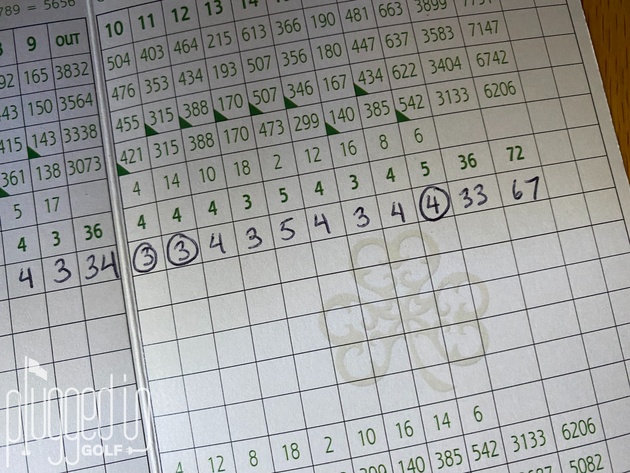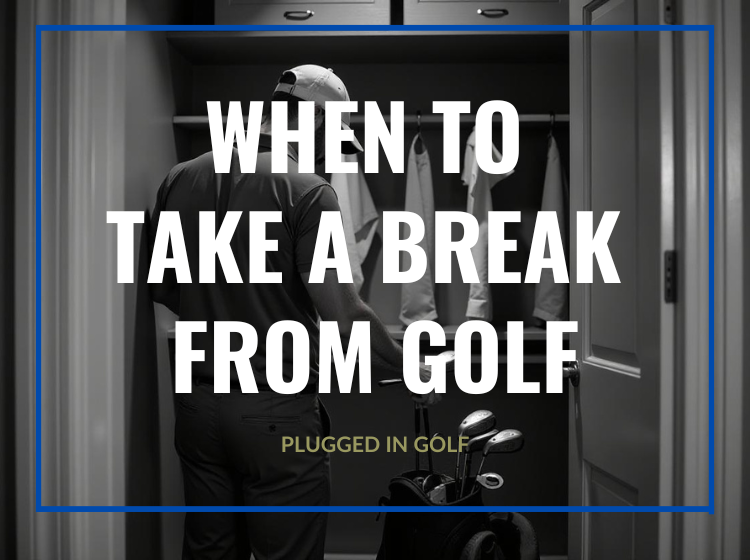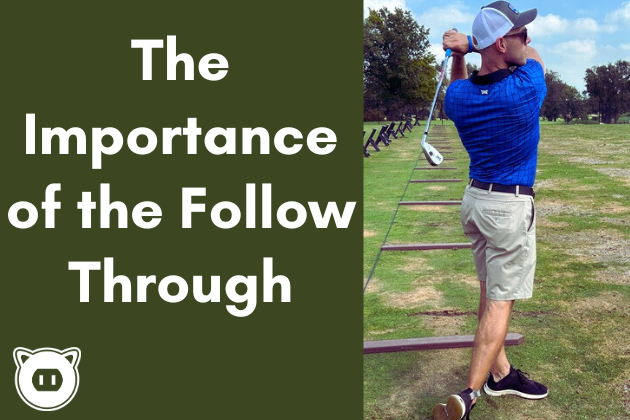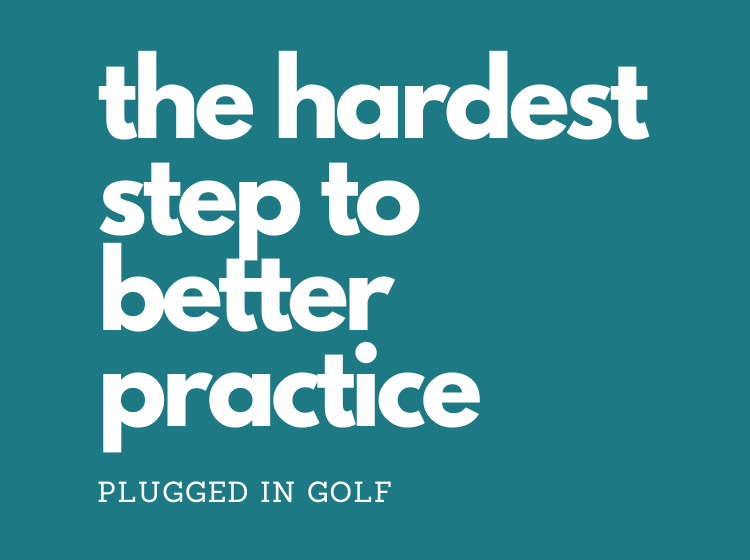A Break From Fun?
For a lot of us, the idea of taking a break from golf sound crazy. Golf is something we love. For most of us, it’s something we don’t spend enough time doing. We sneak out at the crack of down to get a round in or smash a bucket of balls after work as the sun sets.
But sometimes, a break from golf can be a good thing. In this lesson, I’ll discuss when you might want to take a break from golf and how it can help your game.

When to Consider Taking a Break
There are two main reasons why you should take a break from golf: score and emotions.
If you play golf strictly or predominantly for score, and your scores aren’t improving, you may want to take a break. There are several reasons why a break can be beneficial to your scores – I’ll discuss them in detail shortly – but it can also be worthwhile simply to stop beating your head against a wall. Not meeting your scoring expectations can be frustrating and demoralizing, which leads us to the feelings bucket.
Golf is supposed to be fun, recreation, relaxation. It’s not your job. It’s not life-or-death. If you’re not enjoying your time on the course, it might be time for a break.
That’s not to say that every moment on the golf course needs to have you doing cartwheels. Golf is hard. That difficulty is what makes it satisfying when you succeed. But if you’re not looking forward to your rounds, it might be time for a break. If you look back on your round and realize that the dominant emotions are stress, anxiety, fear, or apprehension, there are probably better places for you than the golf course, at least for a time.
What’s the balance of fun and score? Matt and Andy discuss HERE

Scoring Benefits of a Break
There are several reasons why a break from golf can help your score. First, it can give your body a chance to recover. Golf is a physically taxing game for everyone, even the young. You’re going from stillness to maximum speed to stopped in about one second. There’s also the high speed collision with the earth (hopefully just on iron and wedge shots). This can lead to back issues, tennis elbow, shoulder problems, and more. Taking time away from golf can allow your body to recover so that you’re not just getting through each round but excelling and enjoying it.
Time away from golf can also give your brain time to recover. The score-obsessed golfer is probably also a player who has a lot of swing thoughts and ideas about the game. This can be great – thinking about strategy and technique can lead to a lot improvement – but it can also be burdensome on the course. Playing good golf requires a balance of active thoughts and calm focus. A break can help tilt the scale towards the latter.
Finally, taking a break gives you a chance to reset your expectations. A lot of players’ score issues are rooted in pressure created by unrealistic expectations. These players were happy when they first started shooting 90 (or 80 or whatever the number is), but now it’s a miserable grind. Taking a little time off can allow you to enjoy your baseline score again, no matter what it is.
Emotional Benefits of a Break
In a word: reset. If you’re not enjoying golf, it’s probably become too routine and your expectations are probably out of line. Getting away from the game can fix both those issues.
When you’re playing every week, it’s easy to lose your appreciation for all the things that make golf great. You’re seeing the same faces, playing the same course, and probably hitting the same shots. That kind of routine can get old, but absence will make the heart grow fonder. After a little time away, your friend’s tired jokes will be funny again, and your home course will be a bit more vibrant.
Resetting your expectations is just as important. Golfers are great at constantly raising the bar for themselves. This is fine to a point, but it can get self destructive. Taking time away gives you a chance to realize that you’re not going to be a Tour player or knock down every flag. No one cares what you shoot except you. Being away from the game can give anticipation and joy a chance to catch up (and hopefully run past) stress and anxiety.
You can also consider getting away from The Biggest Lie In Golf HERE

How Long to Stay Away
How long you need to stay away from golf is entirely personal.
If you’re break is emotion-driven, I think your feelings will tell you when you’re ready to come back. When the excitement and anticipation start coming back to you, you’re probably ready to get back on the course. This could be as little as a couple weeks if you’re just a touch rundown; it could be a couple months if you’re more severely burned out.
For those players looking for a score boost, I would suggest taking at least a month off. This gives your body a sufficient amount of time to heal, your mind time to clear, and your expectations a chance to reset.
What if you don’t want to stop playing golf? Part 2 Coming Soon!
He founded Plugged In Golf in 2013 with the goal of helping all golfers play better and enjoy the game more.
Matt lives in the northwest suburbs of Chicago with his wife and two daughters.
- Performance Golf Click Stick Training Aid Review - October 18, 2024
- Callaway Opus Platinum Wedge Review - October 17, 2024
- When to Take a Break from Golf - October 15, 2024















10 Comments
Funny when articles seem to come at the exact right moment … broke 80 for the first time this year and then went out and shot 100. Feeling both of these reasons so im taking a break! great post! cheers 🍻
I couldn’t agree more. My recent break was 2.5 years and I felt like it did wonders for my love of the game and my perspective of what a “good round” really is. I didn’t want to take a break from fear of losing skill but I was surprised how quickly everything came back.
Completely agree. I had to take a break (and just much less golf on average) this year because I didn’t have the time. When I was able to play, I played so much better and I can only attribute it to having lower expectations and just enjoying being on the course with my friends. Lately I have been playing more, not playing as well and getting too upset about it. I wish winters here were a lot shorter, but I’m looking forward to another break soon and coming back excited about golf again.
I play and practice a LOT and recently took a 2 weeks break to coincide with the greens being cored (which I recommend as an ideal time). It certainly helps you reset physically and emotionally and gives me the energy again to push on in a game which sometimes feels like banging your head against a wall.
How about a follow up article on “How to come back”
Donald,
Thanks for the suggestion. Anything specific you’d like to see in that article? Questions you’d like answered?
Best,
Matt
I take a lot of scoring breaks where I’ll go out and play a round (9 holes), but I don’t keep a total score. I’ll probably keep track of what I’m doing on the hole I play, but forget it and start over on the next hole. I’ll often use those rounds to try out shots I don’t usually play. A high fade over some trees, the roller ball from 50 yards out, etc. I still try to score well, but don’t have any expectations for the round.
I’m out there to enjoy myself and get some exercise mainly, heck even in my scoring rounds that’s the main reason for being there. Like you said in the piece matt, it’s also a way to give myself a little reset because I do play the same course at least 95% of my rounds. Helps keep myself from unrealistic expectations and some mental stress from not meeting said expectations.
Joseph,
I like this plan a lot!
Best,
Matt
I let the weather dictate my breaks from golf and what shoes I wear. I don’t let it dictate anything else in my life other than those two things though. And some people would say that’s my biggest problem, and I say to them, I wish that was my biggest problem.
I have days where I can play with anybody but my problem is I never know who’s going to show up. I find on the good days I look at my target and make the swing no swing thoughts or anything. But most days it’s not that easy when I’ve had those good days the next round out feels like I just started. I would give anything to overcome that